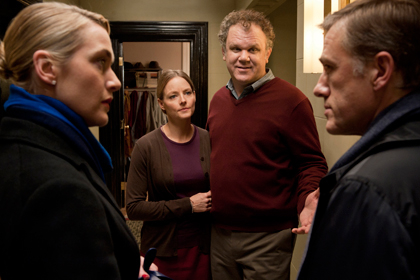Film review: Carnage

Just as Yasmina Reza did in her hit play ‘The God of Carnage’, Roman Polanski traps four bourgeois Brooklynites in one room and relishes their descent into conflict and misery. But Polanski’s elegant and unsettling adaptation takes full advantage of cinema’s apparatus, finds Kate Stables
As the Longstreets and the Cowans meet over cake and coffee to discuss a playground scrap, Carnage invites us to what is possibly the least relaxing social gathering on film since Buñuel’s doomed dinner party. In this crisp, coruscating adaptation of Yasmina Reza’s hit play The God of Carnage, Roman Polanski lays bare the indiscreet charms of the bourgeoisie, substituting a blackly funny naturalism for the more stylised stage antics of the original.
Reza, who adapts her text deftly for the screen with Polanski, strips well-to-do Brooklyn civilisation down to savagery with relish, the film revelling in the afternoon’s rapid, real-time descent into naked aggression, marital misery and existential isolation. In the manner – if without the firepower – of Edward Albee’s Who’s Afraid of Virginia Woolf?, she arms the quartet with words as weapons right from round one. Passive-aggressive mother Penelope can’t resist the pejorative use of “armed” and “disfigured” when describing the injury to her son, injecting a niggling unease into the elaborate conviviality of her chat with increasingly less genial husband Michael and the parents of her son’s assailant, urbanely disengaged lawyer Alan and his defensive wife Nancy.
With the protagonists trapped by Polanski’s cruelly telling shot compositions (which are eloquent but isolating, where the simultaneous interplay of characters on stage was uproarious), the visual mood turns as tense as the conversation. Polanski uses space as brilliantly to express ego-driven social confinement as he did to show urban alienation in Repulsion (1965) or The Tenant (1976), the camerawork pointing up deliciously the shifting and shredding alliances by couple or gender, the verbal assaults that strip their deliverer along with their target, and the eventual comic desolation of the characters. Pawel Edelman’s cinematography and Hervé de Luze’s editing initially draw these patterns subtly, then slide into a more dynamic mode, with extreme close-ups and unsettling cuts underlining the comedy of emotional disintegration.
As the couples fail to agree on whether the boys should be reconciled, remonstrated with or applauded for healthy aggression, the stakes move – from which family is at fault to which view of civilisation. Reza’s script is artful and fluid here, swiftly squaring up Penelope’s improving-liberal take on the world against Alan’s derisive view that violence is inevitable and irresistible. What prevents the dramatic gears crunching, as courtesies crumble (“Their son is a threat to homeland security!”) and betrayals fight with Reza’s characteristic ‘big ideas lite’ for airspace, is the film’s elegance, the balance of humour and argument adroitly held for a neatly honed 79 minutes. It’s a skilful dance of ideas and performances, somehow compensating for the lack of the physical comedy that drove the play so energetically on stage. Though Carnage retains Nancy’s projectile vomiting and Penelope’s handbag-hurling, they’re only socially transgressive on film, not the theatrical explosions that made one flinch in the stalls.
Here the power and the glee are in the uniformly excellent playing; Jodie Foster’s Penelope is a revelation, wringing laughs from every stage of her slide from smug, point-scoring idealist to mean, marriage-wrecking drunk. As her secretly Neanderthal husband Michael, John C. Reilly adds a note of misanthropic menace, and Christoph Waltz’s Alan overcomes the script’s sneaking admiration for his sweeping worldview by the sniggering cynicism of his cell-phone plotting to quell a pharmaceutical scandal. Kate Winslet seems slightly less at ease as Nancy, a role that runs unnervingly and sometimes unevenly from peacemaker to vengeful harpy.
The characters’ all-round unpleasantness, and the film’s merciless mirth-making with their failings, keeps things buoyantly, bleakly funny, the satire spot-on from Dean Tavoularis’s art-crammed aspirational set onwards. But there’s a chip of ice in the film’s heart – a lack of empathy, the kind of pathos that Albee musters for George and Martha, or Ayckbourn for his stumbling couples – which prevents the film attaining the tragicomic status it would seem to deserve.
See also:
The man who wasn’t there: Philip Horne on Polanski’s The Ghost
The Pianist reviewed by David Thompson
The Ninth Gate reviewed by Philip Strick


